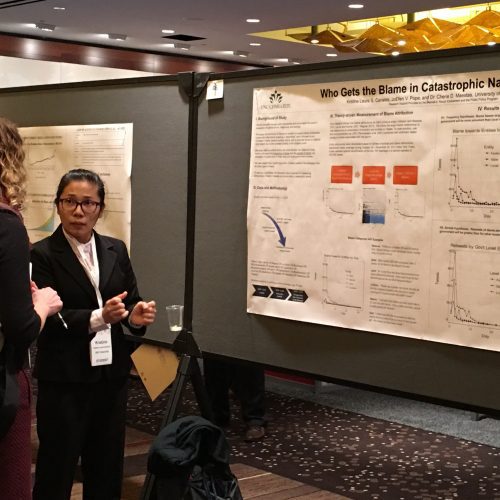Program Structure
Program Requirements
First
Complete a required sequence of core courses, most of which are required in the first year prior to taking qualifying exams.
Introductory Course
Nature of the Field Courses
- PPOL 8600 – Policy Process I (3)
- PPOL 8602 – Research Design in Public Policy (3)
- PPOL 8635 – Ethics of Public Policy (3)
- PPOL 8690 – Seminar in Public Policy (1) (repeated each fall for 3 semesters)*
Methods of Analysis Courses
Economic Analysis Courses
- PPOL 8640 – Economic Analysis of Public Policy I (3)
- PPOL 8641 – Economic Analysis of Public Policy II (3)

Second
After completing core courses, students must sit for three qualifying exams covering:
1. The nature of the field (research design and policy theory);
2. Quantitative methods and evaluation;
3. Economic analysis skills.
Students typically take the qualifying exams in August following their first year of the program.
Third
Complete Policy Application Courses.
Students, in consultation with their advisor, take a minimum of 5 courses (15 credit hours) in a substantive area on which their dissertation will focus. While the core courses prepare students to develop, implement, and evaluate policy, the dissertation research provides the opportunity to put those tools into a substantive context. Public Policy at UNC Charlotte is particularly strong in studying the various aspects of urban policy, including issues of governance, administration, economics, social inequality, education, health, development, criminal justice, and other aspects of urban life locally and globally. Thus, students should, in consultation with their advisor, develop a set of research questions and substantive interest on which their dissertation will focus. Students are encouraged to work with their advisor and the Program Director to design a program of study tailored to their policy interests by combining courses in several of these policy areas. While the particular courses required in each policy area may vary according to prerequisites needed by the student or individual programs of study, the minimum number of required courses in any given policy area is five (5) for 15 credit hours..To see lists of courses related to different policy application concentrations, see the GRADUATE CATALOG.
Advanced Analysis Courses (6 credit hours)
Prior to defending a dissertation proposal, students must complete at least six (6) credit hours of advanced analysis coursework at the doctoral level. These credit hours may also be taken outside the Public Policy program with the approval of the Program Director. Students are encouraged to choose courses that cover the types of analysis that are prevalent in the student’s policy area of interest. Students may select from the following list or take courses in other departments with permission of the Program Director:
- BPHD 8120 – Econometrics I (3)
- BPHD 8130 – Econometrics II (3)
- GRAD 8009 – Topics in Graduate Studies (3) (topic in advanced analysis)
- GRAD 8101 – Linear Regression (3)
- GRAD 8102 – Categorical Outcomes (3)
- GRAD 8103 – Classificatory Methods and Time Series (3)
- GRAD 8104 – Spatial Statistics (3)
- PPOL 8622 – Qualitative Methods in Public Policy (3)
- PPOL 8625 – Advanced Seminar in Spatial Decisions Support Systems (3)

Fourth
Prepare and defend a topic proposal. The topic proposal outlines the policy area on which their dissertation will focus. The topic proposal stage is intended to help the student prepare a full-fledged dissertation proposal. The defense is much more informal than the dissertation proposal itself. Following the successful topic proposal defense, the student prepares and defends a dissertation proposal. Once the proposal is defended, the student advances to candidacy.
The dissertation proposal defense includes an oral presentation and written proposal. During the oral component of the defense, the student addresses not only the specific research topic about which they will write but situates that topic in the larger body of relevant policy literatures. Procedures for establishing the dissertation committee are addressed in the Student Handbook.
Finally
Prepare, write and defend a dissertation. Celebrate when done!

Additional Information
Time Limits for Completion
The student must achieve admission to candidacy (defense of proposal) within six years after admission to the program. All requirements for the degree must be completed within eight years after first registration as a doctoral student. These time limits are maximums. Students will typically complete the degree requirements in five years.
Advising/Committees
While the Program Director serves as the de facto advisor for each student for the first year, the Program Director will work with the students and faculty to help the student work with a suitable advisor. Once the student is matched with the advisor, they will work closely with that advisor on suggested schedules of classes, research options, and other issues important to success. After approximately one year in the program, each student is expected to have identified the faculty member with whom they would like to mentor, with the expectation that this mentor would ultimately serve on the student’s committee. Following completion of the policy field courses, students establish their dissertation advisor and form a dissertation committee. The procedures for establishing these committees are in the Student Handbook and are addressed in the Public Policy seminar.

Transfer Credit
The Program will accept up to two courses (six hours) in the core curriculum as transfer credit from other regionally accredited doctoral institutions, providing that the Admissions Committee (or Director) determines that these courses are equivalent to those offered in the core or one of the specialty areas. The acceptance of transfer credit is subject to the approval of the Graduate School. The grade in these transfer credits must have been A or B. All of the dissertation work must be completed at UNC Charlotte.
Residency Requirement
Students must satisfy the residency requirement for the program by completing 21 hours of continuous enrollment, either as coursework or dissertation credits. Residence is considered continuous if the student is enrolled in one or more courses in successive semesters until 21 hours are earned. All 18 hours of dissertation credit must be earned at UNC Charlotte.
Language Requirement
There is no foreign language requirement in the program coursework.
Research Opportunities
Students are encouraged to engage in original research, and faculty in the program regularly co-author conference papers and publications with PhD students. The Public Policy Program has a large faculty with varied interests to enhance the research opportunities and experiences for the students. Nearly all full time students in the program serve as Graduate Research Assistants for multiple years where they work with faculty on research projects. Many students will also work in the Policy Research Support Lab where they will receive training on several different projects using multiple research methods. Core and affiliated faculty in the program often have grant funded research projects that can support students. See our Research Page for examples of recent and ongoing research projects.